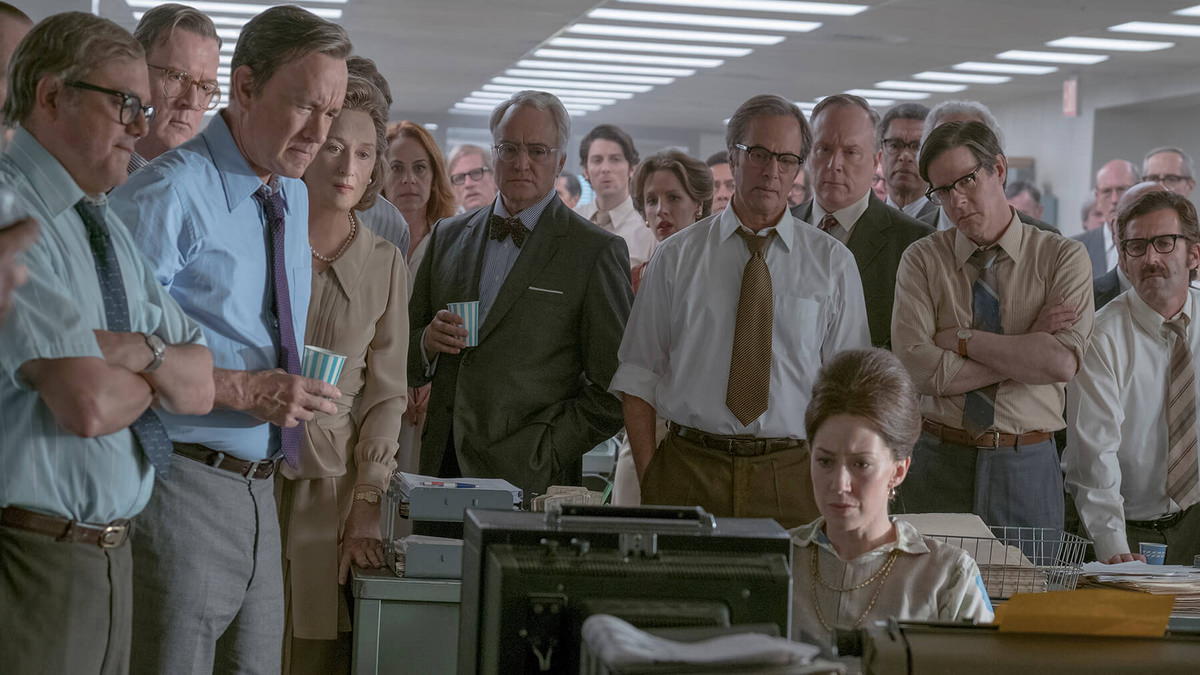LOS ARCHIVOS DEL PENTÁGONO (2017) de Steven Spielberg

“¿Tienes los papeles? – Todavía no”
En poco tiempo, comparado con otras producciones de esta entidad, Steven Spielberg ha conseguido realizar una película sobresaliente e imprescindible que está a la altura de sus mejores trabajos. El reputado cineasta nos deleita con un impecable ejercicio de dirección llevando a la pantalla una historia real con la que rinde homenaje a la profesión periodística en unos tiempos en que las redes sociales parecen dar mejor acogida a cualquier rumor infundado que circule por ellas.
Cabría considerar este film como la precuela de otro título indiscutible: “Todos los hombres del presidente” (1976), con el que emparenta tanto por la época como por sus interesantes argumentos, basados en hechos verídicos y por el excelso resultado que deparan ambas producciones, separadas por 42 años, aunque no lo parecería si se vieran de forma consecutiva.
“Los archivos del Pentágono” (título indudablemente más acertado que el original “The Post”), nos lleva hasta 1971, cuando durante el mandato de Nixon, se filtraron a The New York Times y The Washington Post informes que contenían secretos de Estado. Esos documentos evidenciaban el conocimiento por parte de las altas esferas de la Administración de la debacle en que se había convertido la Guerra de Vietnam, aunque venían vendiendo una versión bien diferente y seguían enviando soldados a aquel infierno. Publicarlos podría ocasionar un cataclismo político, además de los riesgos que corrían los propios periódicos.
Prácticamente, desde la introducción, adopta el tono de un thriller para ir creciendo con cada secuencia. El relato toma como protagonistas a la presidenta y al director del periódico capitalino, entonces todavía considerado de ámbito local y va haciendo una meritoria descripción detallada de sus caracteres y de la relación profesional que les vincula, no siempre pacífica. Ahora bien, tiene el mérito de dotar de entidad a cada uno de los personajes que van interviniendo en la trama, componiendo un tenso e impecable andamiaje narrativo que es también una reivindicación de la libertad de prensa, justo cuando si miramos a la Casa Blanca en estos momentos el mensaje recobra plenamente su vigencia.
Técnicamente, además de una loable ambientación, apreciable en cualquier detalle, nos encontramos con imágenes de texturas muy próximas a la de los largometrajes de los 70, acompañadas de la discreta pero eficaz banda sonora del maestro John Williams.
Un reparto encabezado por Meryl Streep y Tom Hanks, a las órdenes de un genio, necesita de pocos comentarios. Solo cabe apuntar que, estando ambos al nivel que se espera de dos estrellas de su talla, en los “cara a cara“ la actriz de Nueva Jersey gana ligeramente la partida y sus tribulaciones se proyectan de manera palpable.
Por otro lado, sería injusto no destacar las intervenciones del resto del elenco, con mención singular para Bob Odenkirk (“Breaking Bad”), Bruce Greenwood, Sarah Paulson, Matthew Rhys y Jesse Plemons.
Desde luego, la cartelera está de enhorabuena al reunir estos días una oferta de tanta calidad.
Nuestra calificación: (5/5)
“¿Do you have the papers? – Not yet”
In a short time, compared to other productions of this kind, Steven Spielberg has managed to make an outstanding and essential film that is at the height of their best work. The renowned filmmaker delights us with an impeccable management exercise by bringing to the screen a true story with which he pays homage to the journalistic profession at a time when social networks seem to welcome any unfounded rumor circulating through them.
This film could be considered as the prequel to another indisputable title: «All the President’s Men» (1976), with which it is related both for the time and for its interesting arguments, based on true facts and for the excellent result of both productions. , separated by 42 years, although it would not seem it if they were seen consecutively.
«The Post» takes us to 1971, when during Nixon’s tenure, reports containing State secrets were leaked to The New York Times and The Washington Post. These documents evidenced the knowledge on the part of the Administration of the debacle in which the War of Vietnam had become, although they were selling a very different version and they continued sending soldiers to that hell. Posting them could cause a political cataclysm, in addition to the risks run by the newspapers themselves.
Practically, since the introduction, adopts the tone of a thriller to grow with each sequence. The story takes as its protagonists the president and the editor of the capital newspaper, then still considered local and is making a meritorious detailed description of their characters and the professional relationship that binds them, not always peaceful. Now, it has the merit of providing each of the characters that are intervening in the plot, composing a tense and impeccable narrative scaffolding that is also a vindication of press freedom, just when we look at the White House in these moments the message fully recovers its validity.
Technically, in addition to a laudable setting, appreciable in any detail, we find images of textures very close to the feature films of the 70s, accompanied by the discreet but effective soundtrack of the master John Williams.
A cast led by Meryl Streep and Tom Hanks, under the orders of a genius, needs few comments. It should only be noted that, while both are at the level expected of two stars of their size, in the face to face the New Jersey actress slightly wins the game and her travails are projected in a palpable manner.
On the other hand, it would be unfair not to highlight the interventions of the rest of the cast, with special mention for Bob Odenkirk («Breaking Bad»), Bruce Greenwood, Sarah Paulson, Matthew Rhys and Jesse Plemons.
Of course, the billboard of cinemas is in luck to bring these days an offer of such quality.
Traducido por: Eduardo Llorente.
Our rating: (5/5)





